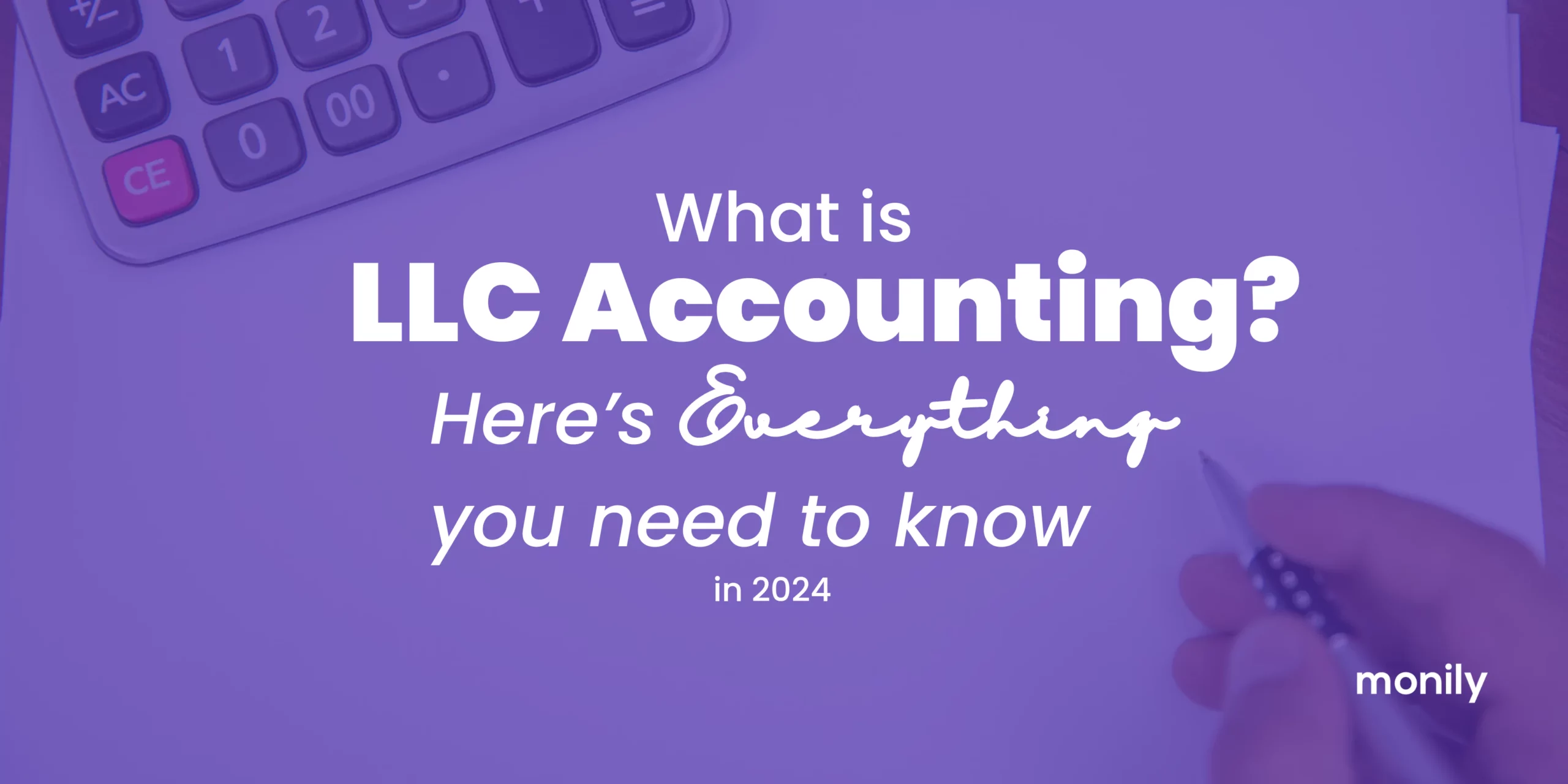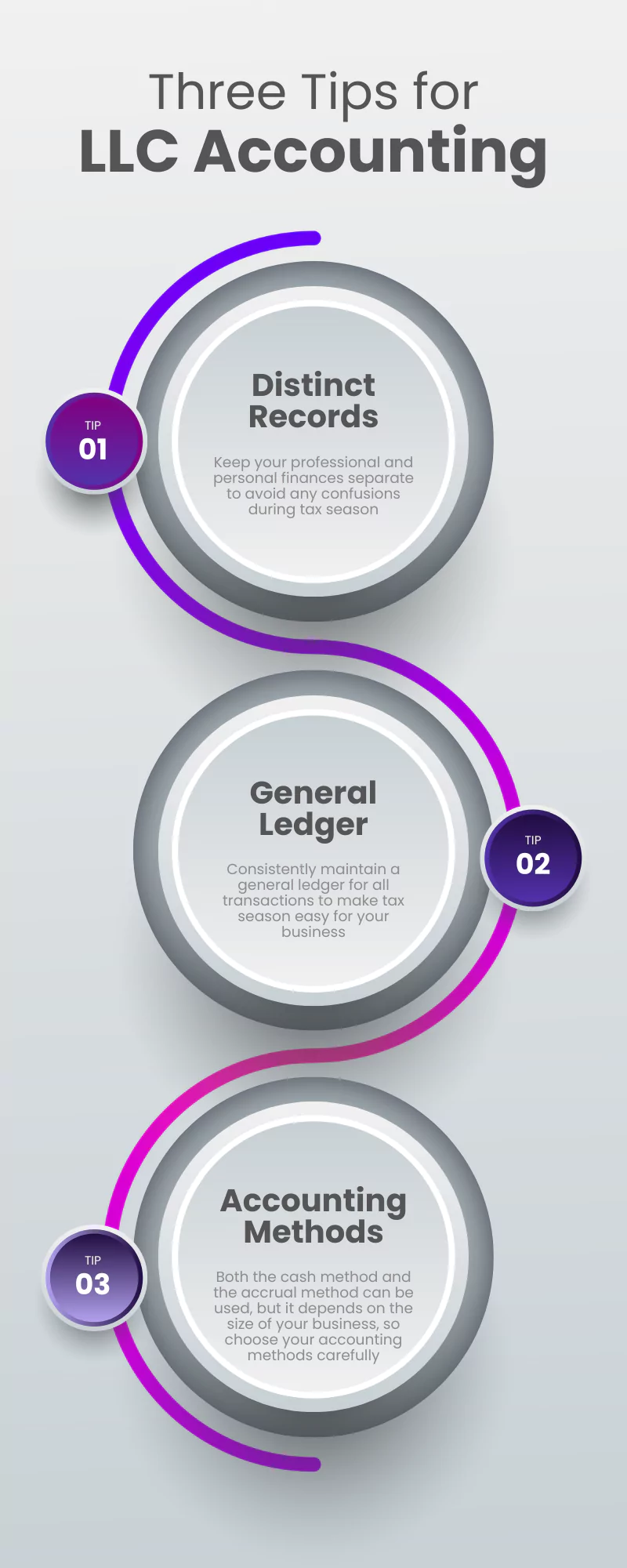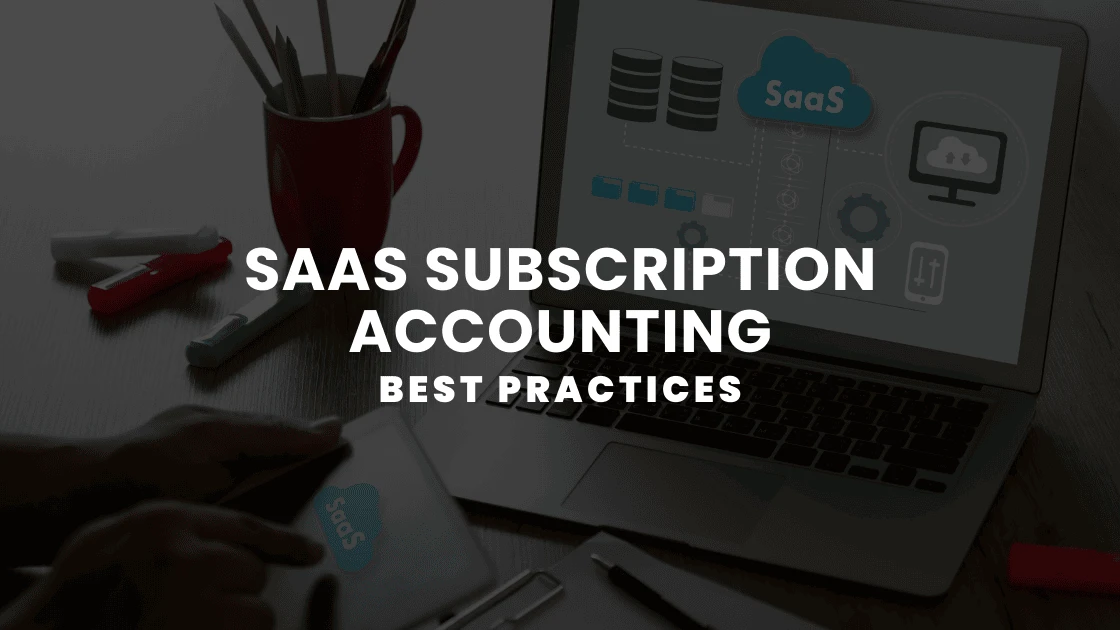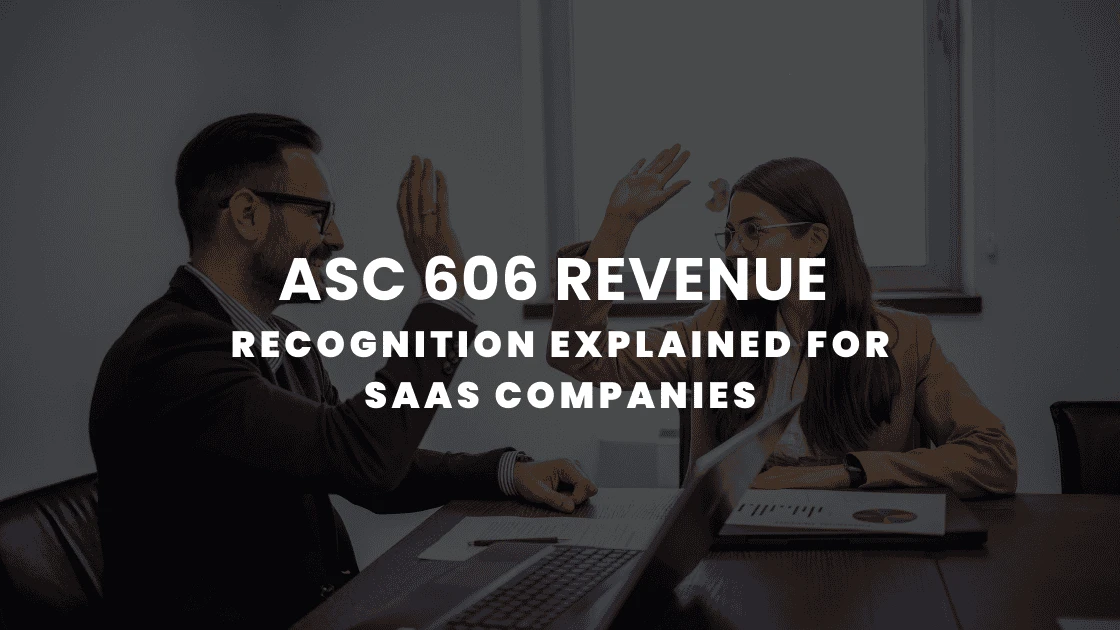May 31 2024 | By Farwah Jafri | 9 minutes Read

What is an LLC?
What is the Right LLC Type for You?
1. Domestic LLCs
2. Foreign LLCs
3. Professional LLCs
4. Non-Profit LLCs
5. L3Cs
6. Series LLCs
Other Types
LLC Accounting Basics!
Tip 1: Keep Your Personal and Business Finances Separate
Tip 2: Your General Ledger Is Your Business Bible
Tip 3: Choose an Accounting Method and Stick to It!
What Does Accounting for LLC Include?
LLC Accounting Basics: Calculating with You
Final Thoughts
Starting your own business can often feel like an adventure. Setting up an LLC is akin to setting sail and taking the first step outside your comfort zone. In the beginning, you’d definitely enjoy that wind sweeping through your hair. But it won’t be long before the currents get strong, and it becomes hard to navigate. LLC accounting can be the compass that pulls you out of the storm.
That’s because LLC accounting is the backbone of all limited liabilities companies. LLC company owners need to focus on building strong accounting strategies that can back up their business finances from the get-go.
If you want that LLC to be successful, you need to make sure it stands out. According to the data accumulated by the IRS, LLCs are now the most popular legal entity throughout the US. Since 2004, LLCs have had an edge over S Corps, and the trend continues to surprise us. In fact, the average annual growth for LLCs was marked at a dramatic 20.93 percent!
Before we get ahead of ourselves, let’s pause and reflect on the true meaning of the three letters that make up LLCs. An LLC, also known as a limited liability company, can’t be defined as a partnership or a corporation. However, it can often be compared to a corporation in the sense that it has many of the same rights, without the same tax liabilities.
So, you get limited liability without being forced to maintain a large business corporation. Convenient? It definitely is!
However, with that said, an LLC company comes with its fair share of complications. LLC accounting can often be confusing, especially if you don’t have an expert to hold your hand through the process.
LLCs aren’t just of one kind. In fact, there are many different types of LLCs you may come across. These include;
For these LLCs, only state laws apply. Unlike foreign LLCs, these just need to abide by the rules and regulations set by the state where they operate. These kinds of LLCs are commonly opted for by startups and small to medium sized businesses, or any type of business that wants to confine its operations to a particular state.
Unlike a domestic LLC, a foreign LLC is licensed to operate in more than one state. Although its state of origination, also known as its domestic state, is one, it operates in more than one state. To become a foreign LLC, it is essential to have operations in multiple states, and possess the required documentation to back up that claim.
Professional LLCs are often ones run by licensed professionals in a particular field, for example, a doctor or a lawyer running their own practice. These LLCs are required, by law, to be run by professionals who are qualified enough in the specific field that relates to the LLC.
This structure comes with restrictions and benefits. Naturally, to prove yourself a non-profit LLC, it is essential to abide by certain rules such as limited ownership, restricted profit distributions, and much more. However, these LLCs are often tax-exempt, with their donors also receiving special privileges.
These are often formed for humanitarian efforts but are profit-based unlike the previous one.
These operate much like other LLCs except their debt is often distributed amongst smaller units within the LLCs, also known as series. This is a huge responsibility as the person this debt is allocated to can be held accountable if the company goes bankrupt.
Some other types of LLCs include;
When you read the term “LLC accounting,” what is the first thought that goes through your mind? For us it would have to be, “is it any different from general accounting?” In a way, many of the same rules apply. It is essential to align with basic accounting principles. But a true expert will always advise you to invest in certain small changes based on the structure of your business.

This is pretty basic but can certainly surprise you once tax season rolls around. For any business, not just an LLC, it is wise to keep your personal and business finances separate.
Maintaining distinct bank accounts is a small but crucial detail as that can help you establish clear boundaries for any issues that may arise in the future. You may postpone the activity to the near future, but it can turn into a real mess in case your business suffers a huge loss or goes bankrupt.
That’s not the only reason! Maintaining separate records makes it much easier for you to accurately record your financial position and create strategies accordingly. You know the income and expenses that relate to the business and can prepare your taxes without any inconsistencies. This allows you to avoid many legal issues and it can also clarify deductible business expenses during tax season.
A guide on LLC accounting basics is incomplete without analyzing the importance of a general ledger. Forbes identifies a general ledger as a “central database” that gives an accurate account of all your transactions, be it expenses, or income related.
Once you start to record all your earnings and expenses in the general ledger, you ensure a consistent record maintenance that can help when the year ends. All financial statements remain with your company all year and it becomes much easier to handle the tax season.
When you think of general ledger, thick manual records may naturally come to mind. However, that’s not necessarily the case. LLC accounting can easily be done through online cloud-based accounting software and tools that automate your bookkeeping and keep your finances in check.
It is important to choose an accounting method at the very start of the business, preferably when you are creating an LLC accounting blueprint for the future. Accounting for LLC is incomplete without a consistent LLC accounting method to follow. Here are two that you can choose from;
The accounting procedures and practice used by an LLC combine elements of many other company structures into one that provides limited liability to owners. Here are some key characteristics of LLC accounting;
Struggling to visualize it without the numbers? Not to worry! Here are some basic calculations that may put it into perspective;
Company Profile
Name: TechPros LLC
Services: IT Consulting
Members: Alex, Sam, and Jordan
Profit Sharing: Alex 50%, Sam 30%, Jordan 20%
Established: January 1, 2023
Financial Overview (FY)
Income Statement:
Revenue: $200,000 (from different IT consultations)
Expenses $120,000 (combination of salaries, rent, advertising, equipment purchase cost, etc.)
Net Income: $80,000 (Revenue – Expenses)
Balance Sheet:
Assets: $35,000 (Cash and equivalents, Accounts Receivable, Inventory, Investments, Furniture, etc.)
Liabilities: $15,000 (Loans, Accounts Payable, Accrued Expenses, etc.)
Member Equity: $20,000 (Assets – Liabilities)
Member Draws:
Alex: $40,000 ($80,000 * 50%)
Sam: $24,000 ($80,000 * 30%)
Jordan: $16,000 ($80,000 * 20%)
LLC Final Earnings: $35,000 Initial Cash (Net Profit distributed amongst members above)
Taxes:
Let’s assume the following basic tax rates:
Federal Income Tax Rate: 22%
State Income Tax Rate: 5%
Alex’s taxes:
Share of Net Income: $40,000
Federal Taxes: $40,000 * 22% = $8,800
State Taxes: $40,000 * 5% = $2,000
Total Taxes: $8,800 + $2,000 = $10,800
After-Tax Income: $40,000 – $10,800 = $29,200
Sam’s taxes:
Share of Net Income: $24,000
Federal Taxes: $24,000 * 22% = $5,280
State Taxes: $24,000 * 5% = $1,200
Total Taxes: $5,280 + $1,200 = $6,480
After-Tax Income: $24,000 – $6,480 = $17,520
Jordan’s Taxes:
Share of Net Income: $16,000
Federal Taxes: $16,000 * 22% = $3,520
State Taxes: $16,000 * 5% = $800
Total Taxes: $3,520 + $800 = $4,320
After-Tax Income: $16,000 – $4,320 = $11,680
Equity:
Let’s assume Alex, Sam, and Jordan had the following equity when they formed TechPros LLC
Alex: $10,000
Sam: $5,000
Jordan: $3,000
Their final equities would then be;
Initial Equity + Net Income Share – Draw
Alex: $10,000 + 40,000 – $40,000 = $10,000
Sam: $5,000 + $24,000 – $24,000 = $5,000
Jordan: $3,000 + $16,000 – $16,000 = $3,000
Accounting for LLC can be easy with the right guidance. To meet the legal obligations of an LLC, it is important to have an efficient financial reporting process. However, that doesn’t mean you must hire a full-time bookkeeper or CFO to manage the complexities.
An in-house financial expert can be quite costly, especially when you are just starting out. Moreover, disruptions arising from sick leave, vacations, or abrupt resignations as well as performance dips can put your company’s finances in jeopardy.
That is exactly why Monily is a great match for you. We can get you in touch with reliable financial experts that you can hire by the hour or for specific services. From bookkeeping to integrating with complicated accounting software, they can do it all. Book a consultation today and speak with one of our financial experts to understand our process!
Subscribe for business tips, tax updates, financial fundamentals and more.
MORE BLOGS

Running a SaaS business can look simple from the outside. Customers sign up, pay monthly or yearly, and keep using the product. Quite straightforward, right? Behind […]
Learn More →
Revenue is the heartbeat of any SaaS business. But how and when that revenue shows up on your books can change everything, from investor confidence to […]
Learn More →
If you’re a small business, we will absolutely get it if you say you’re having a hard time choosing a payment platform for your company. And […]
Learn More →